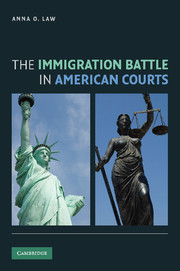Book contents
- Frontmatter
- Contents
- List of Tables and Figures
- Acknowledgments
- 1 Introduction
- 2 How Do We Know What We Know? Data, Methods, and Initial Findings
- 3 The Rise of Two Courts with Differentiated Functions
- 4 Interstitial Policy Making in the U.S. Courts of Appeals
- 5 Institutional Growth and Innovation: The Ninth Circuit Court of Appeals and Immigration
- 6 Continuity Amid Change: The Federal Courts' Commitment to Due Process
- 7 Conclusion
- Appendix A Further Elaboration of Case Selection Methods
- Appendix B Further Elaboration on the Search for Modes of Legal Reasoning
- Appendix C Numerical Codes for Modes of Legal Reasoning
- Appendix D Interview Questions
- Index
- References
3 - The Rise of Two Courts with Differentiated Functions
Published online by Cambridge University Press: 04 August 2010
- Frontmatter
- Contents
- List of Tables and Figures
- Acknowledgments
- 1 Introduction
- 2 How Do We Know What We Know? Data, Methods, and Initial Findings
- 3 The Rise of Two Courts with Differentiated Functions
- 4 Interstitial Policy Making in the U.S. Courts of Appeals
- 5 Institutional Growth and Innovation: The Ninth Circuit Court of Appeals and Immigration
- 6 Continuity Amid Change: The Federal Courts' Commitment to Due Process
- 7 Conclusion
- Appendix A Further Elaboration of Case Selection Methods
- Appendix B Further Elaboration on the Search for Modes of Legal Reasoning
- Appendix C Numerical Codes for Modes of Legal Reasoning
- Appendix D Interview Questions
- Index
- References
Summary
What is the role of the federal judiciary in the American political system? An examination of the earliest debates about the federal judiciary reveal competing visions of the proper roles, missions, and functions of that institution among the founders. It becomes apparent, when tracing the evolution of the judiciary, that the design, establishment, and modification of the judiciary were the result of political accommodation of an array of sometimes conflicting interests. Instead of being the outcome of a carefully designed master plan, the institutional development of the U.S. Supreme Court and U.S. Courts of Appeals illustrates what historical institutionalists refer to as the “cumulative consequences of partial reforms.” And without a plan that had as its priority the long-term efficacy of the judiciary, the trajectory of these two courts has a spawned a series of unintended consequences, including a rise in the prestige of the Supreme Court and a sharpening division of labor between the Supreme Court and the Courts of Appeals. The judicial system has evolved in a different way than the founders expected. Yet the contemporary federal judiciary has succeeded in fulfilling the aspirations of the founders for the normative role and mission of the institution – albeit with different structural forms to protect such values.
The chapter opens with analysis of the Federalists' and Anti-Federalists' conceptions of the role, mission, and functions of the federal judiciary.
- Type
- Chapter
- Information
- The Immigration Battle in American Courts , pp. 54 - 101Publisher: Cambridge University PressPrint publication year: 2010



